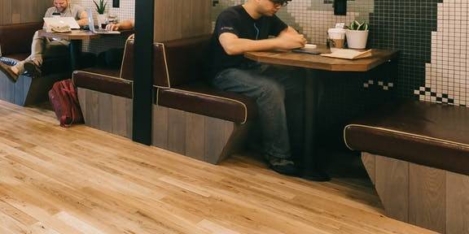To provide the best experiences, we use technologies like cookies to store and/or access device information. Consenting to these technologies will allow us to process data such as browsing behaviour or unique IDs on this site. Not consenting or withdrawing consent, may adversely affect certain features and functions.
The technical storage or access is strictly necessary for the legitimate purpose of enabling the use of a specific service explicitly requested by the subscriber or user, or for the sole purpose of carrying out the transmission of a communication over an electronic communications network.
The technical storage or access is necessary for the legitimate purpose of storing preferences that are not requested by the subscriber or user.
The technical storage or access that is used exclusively for statistical purposes.
The technical storage or access that is used exclusively for anonymous statistical purposes. Without a subpoena, voluntary compliance on the part of your Internet Service Provider, or additional records from a third party, information stored or retrieved for this purpose alone cannot usually be used to identify you.
The technical storage or access is required to create user profiles to send advertising, or to track the user on a website or across several websites for similar marketing purposes.
 Nearly half (45 percent) of US workers say they earn extra income by using a side hustle, according to a new report from Bankrate.com. This includes both full-time (43 percent) and part-time (51 percent) workers. For most (66 percent), the extra money accounts for less than half of their monthly earnings. However, around a third of the 2,550 people surveyed say the extra income is needed to pay regular living expenses. Slightly more (34 percent) say they use the money for discretionary spending and 27 percent say it’s to boost their savings. (more…)
Nearly half (45 percent) of US workers say they earn extra income by using a side hustle, according to a new report from Bankrate.com. This includes both full-time (43 percent) and part-time (51 percent) workers. For most (66 percent), the extra money accounts for less than half of their monthly earnings. However, around a third of the 2,550 people surveyed say the extra income is needed to pay regular living expenses. Slightly more (34 percent) say they use the money for discretionary spending and 27 percent say it’s to boost their savings. (more…)








 Socialising and drinking opportunities are some of the least enjoyable things about working in London, as loving their job and a chance to grow personally is more of an incentive for those who work in the Capital, a new report suggests. The survey of 1,000 London workers by Flexioffices, claims that 75 percent of employees in the city enjoy going to work for the personal development opportunities, training and the job itself. Flexible hours are becoming an increasingly enticing aspect of a job, with 21 percent of London workers liking their workplace because of the flexible hours available.
Socialising and drinking opportunities are some of the least enjoyable things about working in London, as loving their job and a chance to grow personally is more of an incentive for those who work in the Capital, a new report suggests. The survey of 1,000 London workers by Flexioffices, claims that 75 percent of employees in the city enjoy going to work for the personal development opportunities, training and the job itself. Flexible hours are becoming an increasingly enticing aspect of a job, with 21 percent of London workers liking their workplace because of the flexible hours available.


 Over a third of respondents (36 percent) to a new survey report they are commuting for more than 90 minutes a day; yet despite a high demand for employer provisions to help alleviate the stress of the commute such as flexible or remote working and season ticket loans, 43 percent of employees stated that these were not currently offered by their employer. The Commuter Survey from Office Space in Town also claims that among the top commuting complaints were: lengthy journeys (32 percent); overcrowding (27 percent) and delays and frequent cancellations (26.01 percent). With the survey also revealing 75 percent take the commute into account when making their employment decisions, there is a lot that employers could be doing to minimise the negative impact on employee attraction and retention.
Over a third of respondents (36 percent) to a new survey report they are commuting for more than 90 minutes a day; yet despite a high demand for employer provisions to help alleviate the stress of the commute such as flexible or remote working and season ticket loans, 43 percent of employees stated that these were not currently offered by their employer. The Commuter Survey from Office Space in Town also claims that among the top commuting complaints were: lengthy journeys (32 percent); overcrowding (27 percent) and delays and frequent cancellations (26.01 percent). With the survey also revealing 75 percent take the commute into account when making their employment decisions, there is a lot that employers could be doing to minimise the negative impact on employee attraction and retention.




 Nearly three quarter (70 percent) of employment law experts have seen an increase in women claiming they were fired when on maternity leave; the use of ‘gagging orders’ following pregnancy and maternity related disputes and an increase in men claiming harassment by their employer for taking paternity leave.
Nearly three quarter (70 percent) of employment law experts have seen an increase in women claiming they were fired when on maternity leave; the use of ‘gagging orders’ following pregnancy and maternity related disputes and an increase in men claiming harassment by their employer for taking paternity leave.















